|
|
|
Sort Order |
|
|
|
Items / Page
|
|
|
|
|
|
|
| Srl | Item |
| 1 |
ID:
136711
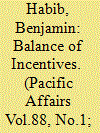

|
|
|
|
|
| Summary/Abstract |
This study is concerned with motivations driving North Korea’s interaction with the United Nations Framework Convention on Climate Change, drawing on information from treaty reporting documents, along with project reports compiled by international agencies and official statements released by the North Korean government. The article draws on causal inference to explore the hypothesis that the leadership perpetuation and state survival imperatives of the North Korean government represent the most likely explanation for North Korea’s interaction with the international climate change regime. It finds a strong probability that North Korea is utilising the UNFCCC as a capacity-building vehicle across its agricultural and energy sectors, a weak issue_images_88_1_Hydroelectric dam at Sinpyong (July 2012)_Habibpossibility that North Korea’s climate change vulnerability is a compelling incentive for greenhouse gas mitigation, and the weak possibility that North Korea is using the Clean Development Mechanism under the UNFCCC as a means for generating foreign currency revenue. The paper argues that the balance of incentives underpinning these motivations can be linked to the leadership perpetuation and state survival imperatives of the North Korean government.
|
|
|
|
|
|
|
|
|
|
|
|
|
|
|
|
| 2 |
ID:
136712
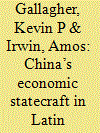

|
|
|
|
|
| Summary/Abstract |
Most scholars and policy-makers classify the motivation behind China’s global economic activity as an effort to project soft power or to exercise “extractive diplomacy” by locking up natural resources across the globe. In this paper we argue that China, through its state financial institutions and firms, is also significantly motivated by simply commercial reasons. To shed light on this debate, we examine the extent to which China’s policy banks provide finance to sovereign governments in Latin America. We find that Chinese policy banks now provide more finance to Latin American governments each year than do the World Bank and Inter-American Development Bank (IDB). Indeed, the large loan size, high interest rates and focus on industry and infrastructure of Chinese finance has less in common with these international financial issue_images_88_1_ChinaLatinAmerica01institutions (IFIs) and more in common with the private sovereign bond market. In this way, Chinese finance appears primarily commercial in nature. Chinese banks offer slightly lower interest rates than the private market, but these are not necessarily concessional subsidies to support a political agenda. The Chinese banks are exposed to less risk because they tie their loans to equipment purchase requirements and oil purchase contracts. Through these risk-lowering arrangements, Chinese banks can profit by lending to countries that have been priced out of the sovereign debt market. While it can be difficult to distinguish between the three types of economic statecraft outlined above, we argue that commercial profit is also a major force behind China’s economic statecraft that has been largely overlooked.
|
|
|
|
|
|
|
|
|
|
|
|
|
|
|
|
| 3 |
ID:
136709
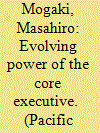

|
|
|
|
|
| Summary/Abstract |
This article addresses the transformation of the state by exploring the case of Japan’s ICT regulation between the 1980s and 2000s prompted by the challenge to the state after the 1980s. It sets out to challenge the dominant pluralist and rational choice literature in Japanese politics that takes an elitist perspective with the concept of the core executive, referring to the body of statist literature, that employes data drawn from the interview of elites. What emerges from this study is a variation on state transformation with a fluid change of power within the core executive in ICT regulation. This can be understood as a dynamic reconstitution process of the Japanese state in response to the challenges both sector-specific and beyond. Mobilised by the change of power, the reconstitution of the Japanese state has transformed the developmentally-oriented characteristic of the Japanese state led by civil servants. Elsewhere, by focusing on the state at a macro level and power relations within the core executive, this article reveals the dominance of the core executive in ICT regulation. It concludes that the Japanese state has retained dominance over society through its reconstitution mobilised by the core executive within which the fluid change of power has occurred between actors.
|
|
|
|
|
|
|
|
|
|
|
|
|
|
|
|
| 4 |
ID:
136708
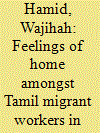

|
|
|
|
|
| Summary/Abstract |
Low-wage Tamil migrant workers have long been contributing to Singapore. Despite labouring for three decades and being connected to the existing Tamil diasporic community in Singapore, they have been left out in both state rhetoric and society, often due to claims of transience. Conversely, a fatal traffic accident in the locality of Singapore’s Little India in December 2013 involving a Tamil migrant issue_images_88_1_Hamid_Figure11worker that morphed into a ‘riot’ has again brought these men and their presence within the vicinity of Little India to the fore. This paper uses the concept of “transnational home” as a lens to study their everyday experience in Singapore’s Little India. The homely feelings experienced by the migrant workers highlight their feelings of homesickness vis-à-vis the need for a sense of belonging felt amongst transnational male migrant workers. On the other hand, practices that make the space unhomely for them not only illustrate their social position but will also contribute to the study of the governmentality of migration and control of migrant bodies.
|
|
|
|
|
|
|
|
|
|
|
|
|
|
|
|
| 5 |
ID:
136710
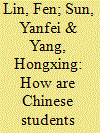

|
|
|
|
|
| Summary/Abstract |
Students have always played an important role in defining the politics of China, and their ideological orientation shapes the nature of student politics. Through a survey of students from six elite universities, this study explores the outlook of Chinese youth’s political identities and analyzes the factors conditioning their identity formation. The results reveal three trends. First, the majority of these college students either claim themselves to be apolitical or to be liberals. Second, among various channels of political (re)socialization, family plays a weak role, while mass media has a strong influence on students’ political orientation. Peking University, the base for nurturing liberals in the 1990s, has now yielded this role to universities specializing in economics and finance, thus suggesting the impact of economic liberalism since the 1990s. Third, gender, education level, academic major, family income, and Communist Party membership are all good indicators of students’ political identities. These results are interpreted in the context of student movements and intellectual transition in China over the past four decades.
|
|
|
|
|
|
|
|
|
|
|
|
|
|
|
|
| 6 |
ID:
136713
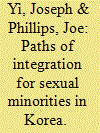

|
|
|
|
|
| Summary/Abstract |
Phillips, Joe
|
|
|
|
|
|
|
|
|
|
|
|
|
|
|
|
|
|
|
|
|